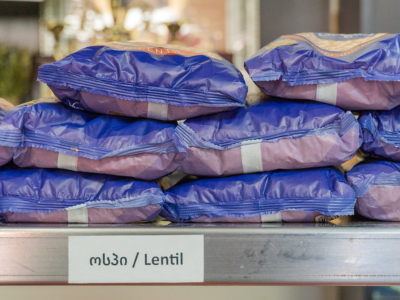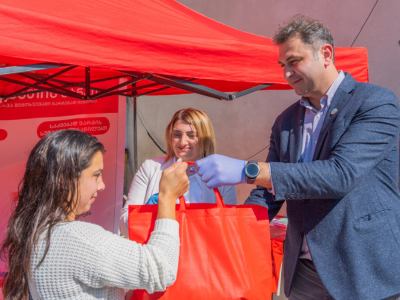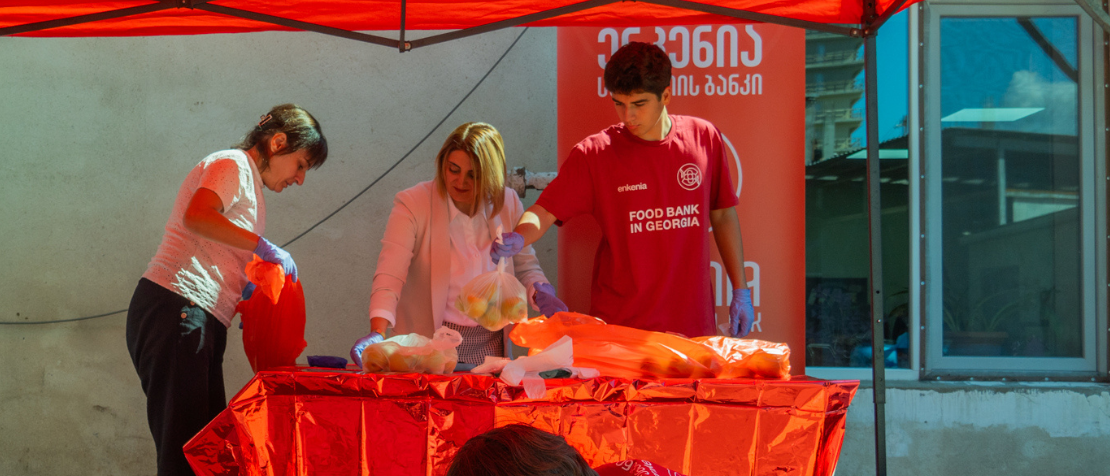.png?sfvrsn=659fd632_3)
A champion for food security: fighting food loss and waste on the ground
Georgian changemaker’s fight for food security turns surplus into sustenance and waste into hope
FAO/Guram Saqvarelidze
29/09/2025
Every year, millions of tonnes of edible food are lost or wasted worldwide, while millions of people lack access to food. On this year’s International Day of Awareness of Food Loss and Waste, celebrated on 29 September, the story of Nana Olkishvili – founder of Enkenia, the first officially recognized food bank in Georgia – shows how individual determination can drive meaningful change.
From charity work to organized campaigning
“I started this journey back in 2007,” recalls Nana Olkishvili. “At church, on major holidays, we selected families in need. People donated food or money, and we distributed it.”
But it was in 2016 that Nana experienced the moment that would redefine her mission.
“Near my house, there were dumpsters where restaurants threw away large amounts of food,” Nana says. “I would see it late at night, and this affected me deeply. I contacted the restaurant owners. Since we were already helping families, I suggested placing refrigerators at their entrances so we could collect the food and distribute it. But as a private individual, I wasn’t allowed. They said, ‘It is not possible to give you – an individual, this food.’ I had to think of ways of making this work.”
Realizing that good intentions were not enough, Nana established Enkenia as a formal charity organization.
“From the very beginning, I researched food banks. I wanted to create one here. But when I approached companies, I was refused. Donations were taxed, and businesses didn’t want that burden. Meanwhile, so much food was still being wasted.”
Law as a turning point
In 2023, with support from FAO and funding from the European Union, a legislative dialogue brought together stakeholders to design mechanisms for food loss and waste reduction and food donation. The result was historic: On 4 October 2023, the Parliament of Georgia approved the Law on Food Loss and Waste Reduction and Food Donation.


“When I learned that the law was being drafted, I was so happy,” Nana says. “This law opened the door for the establishment of food banks in Georgia. It meant that surplus food could be redistributed legally and safely. For us, it was a breakthrough.” © FAO/Guram Saqvarelidze
Enkenia quickly implemented hazard analysis and critical control point (HACCP) standards to ensure food safety, setting up a warehouse and procedures in line with national regulations. Inspectors from the National Food Agency of Georgia confirmed compliance, and Enkenia became the first organization in the country officially authorized as a food bank.
“We are five people at the core, and all of us are maximalists,” Nana laughs. “If one of us misses something, the others will not let it slide. We are all from the education sector, so we studied, trained and made sure we did everything right. When we passed inspection, it turned out we were the first. It was a proud moment.”
There is no food security without food safety
“Food safety is at the heart of what we do,” Nana stresses. “Every product must be labelled. Shelves can’t be placed against walls. The warehouse floor, the materials, even the way food is stored – it all matters. Food safety standards guarantee food security for the people we serve.”
These principles are not abstract. They translate into healthier lives for Enkenia’s beneficiaries: people with disabilities, large families, the single elderly, and others across Georgia. Volunteers in different regions support distribution locally.
“At first, we travelled everywhere to reach people,” Nana explains. “Now we realized it is more practical to empower local volunteers. They serve their own neighborhoods, and it works better.”
Renewal through sharing
The name “Enkenia”, which means “renewal” in Greek, reflects both the organization’s vision and its spirit.
“We do not just give food,” Nana says. “We sometimes collect clothes, toys, hygiene products. People need renewal. That is what we try to bring.”
Community engagement is key. Recognizing this, Nana and her team have implemented various campaigns and offers. Donation boxes in schools encouraged children to give food during Christmas, Easter and New Year.
“Children brought donations with such joy,” Nana remembers. “They even challenged each other: Who could give more? They shared happiness by giving.”
Now Enkenia is expanding this idea to retail stores.
“We are starting a pilot project with donation boxes in four supermarkets,” she says. “Shoppers will be able to buy and immediately donate selected products. There will be banners explaining what can and cannot be donated. We will see how it works and hopefully grow the initiative.”
A clear list of eligible products is important, as the law prioritizes non-perishable donations.
Companies also are invited to take part.

“We suggest food donation as a form of team building,” Nana says. “Just recently, a company donated funds, bought products, and their employees distributed the food themselves. They said it was one of the happiest days of their lives; seeing so many people blessed by their actions changed them.” © FAO/Guram Saqvarelidze
Growing capacity to achieve change
Despite these successes, the challenge remains huge. An estimated 600 000 tonnes of food is wasted each year in Georgia. In compliance with the adopted law, large supermarket chains prepare to donate food. Nana and her team are planning how to manage these large volumes efficiently.
“No single organization can handle this volume,” Nana admits. “That is why we are creating an association of food banks. We want to unite organizations like ours to maximize our impact. If surplus food is managed properly, maybe groups like Enkenia won’t even be needed anymore – and that would be the greatest success.”
A message for the International Day of Awareness of Food Loss and Waste
On this global day of reflection, Nana’s words resonate far beyond Georgia.
“Food loss and waste reduction is not just about logistics. It’s about rethinking our relationship with food, with nature, and with each other. Every food item saved strengthens our food security and renews hope.”
And perhaps her most powerful reminder is the simplest:
“Every piece of food saved is a blessing for a family in need. That is the real renewal.”
FAO in Georgia
